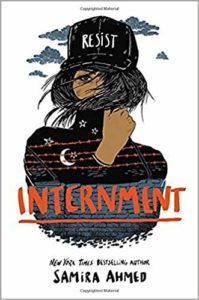 In a United States of the near future, a racist President tweets and riles up his supporters. His party, which controls Congress, has passed laws forcing Muslims to register and has dismissed them from public employment and schools. While the propagandized residents of her Southern California college town are carrying subversive books to a community book-burning, 17-year-old Layla Amin is sneaking through town to visit David, her Jewish boyfriend. They’re just teenagers defying curfew to canoodle, but curfew is imposed by the regime and they can be shot for being in the wrong place at the wrong time. Things go from bad to worse when Layla returns home. Yes, her parents are angry that their only child has put herself in danger, but by midnight, the Exclusion Force appears at their door to take them to a remote internment camp in the California desert, not far from the Manzanar camp where thousands of Japanese Americans were interned during the Second World War.
In a United States of the near future, a racist President tweets and riles up his supporters. His party, which controls Congress, has passed laws forcing Muslims to register and has dismissed them from public employment and schools. While the propagandized residents of her Southern California college town are carrying subversive books to a community book-burning, 17-year-old Layla Amin is sneaking through town to visit David, her Jewish boyfriend. They’re just teenagers defying curfew to canoodle, but curfew is imposed by the regime and they can be shot for being in the wrong place at the wrong time. Things go from bad to worse when Layla returns home. Yes, her parents are angry that their only child has put herself in danger, but by midnight, the Exclusion Force appears at their door to take them to a remote internment camp in the California desert, not far from the Manzanar camp where thousands of Japanese Americans were interned during the Second World War.
Refusing to adapt to the regimented life of a prison camp, Layla gets to know other Muslim teenagers – desis (Americans of South Asian heritage like her), Middle Easterners, and Black Muslims – and despite the camp administrators’ efforts to divide and conquer, she forges a resistance spurred on by blog posts sneaked out to David under cover of night and via an unexpected ally.
Samira Ahmed (Love, Hate, and Other Filters) has written another compelling story of Islamophobia and how young people peacefully resist being stereotyped, demonized, excluded, terrorized, and “disappeared.” At a time in which the current President has issued threats against an elected Muslim Congresswoman and banned travel to the U.S. from a half dozen Muslim countries, Ahmed’s dystopian scenario isn’t so far-fetched. In an afterword, she writes, “Fascism isn’t going to simply appear in America one day. It’s here. But so are we.” Her extensive resource list guides readers to the principal models she used in researching Internment, notably the deportation and incarceration of Japanese Americans. Other parallels in the text include the Nazi book burnings, the Nuremberg Laws that deprived German Jews of their rights as citizens, and the White Rose resistance movement of German university students. This novel starts strong and keeps readers turning the pages with escalating action and a sympathetic protagonist. Fans of history will notice the parallels, and budding activists can learn from both Layla’s actions inside the camp and the solidarity of those on the other side of the fence.
1 comment for “What May Happen Next if We Don’t Act Now: A Review of Internment”